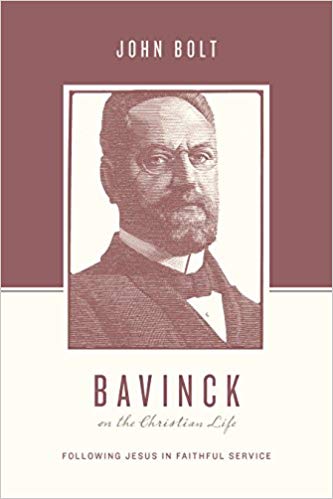John Bolt was born in the Netherlands; immigrated to Canada at the age of three; grew up in a sleeping village south of Vancouver, British Columbia. He is retired professor of systematic theology at Calvin Theological Seminary, Grand Rapids, Michigan; his favorite movie is The Sting; favorite smells are food smells, especially bakery (cinnamon rolls!!); favorite color is green; his first (paid) job was delivering a morning newspaper, The Vancouver Province (up at 5:00 AM); non-academic passions: watching sports, especially my grandkids, reading novels, especially good mystery novels.
You Should Know Herman Bavinck
Interview with John Bolt
Loading...
What is the “Gospel” and what practical implications does the Gospel make in my everyday life?
The Gospel is the good news that God in his grace saves the lost through the work of his Son Jesus Christ and restores us to fellowship with God. This is the treasure, the pearl of great price, that is true and valuable even if it had no consequences for practical life. But it does! Thanks to Christ’s atoning death our sins are forgiven, we are freed from guilt and shame. The gospel thus opens up for those who believe a life of fulfilling service in obedience to God. This life of obedience is fulfilling (because it is right) even if it did not change society; but it does and it has changed entire civilizations because the life of obedience is the only way to live in fullest communion with God by glorifying him in all that we do. The gospel is all about joyful and meaningful communion with God, communion made possible because of what Christ has done for us. The good news is that we have fellowship with God.
What is “sin” and what is so terrible about it when I do sin? And what is my motivation to not sin?
Sin is rebellion against God, and it is a terrible idea for a creature to try and frustrate the will of its maker (clay pots don’t tell their potters off! [Rom. 9:20–21]). Nothing good will ever come of it. In fact, sin destroys those who indulge in it. Our motivation to not sin comes not from fear of punishment (1 John 4:18) but out of gratitude for what God has done for us in Christ and our love for him and our neighbor. Grateful people do not want to disappoint their Maker and Redeemer.
What is God’s end goal for this world, all humans of this world, and me personally? Where is He taking it and what does it look like for me to be a part of that goal, and how can I have a role and purpose in that goal, and find meaning, and value, and my joy in that goal?
God’s end goal is his own glory which includes a new heaven and a new earth where resurrected believers will live in full communion with God and each other, without sin and its consequences such as suffering, pain, and tears. We find our joy in the assurance that this is our destiny especially when we are burdened by the sufferings of this age (Romans 8:18–39). It is this confident hope that has sustained the countless Christians martyrs over twenty centuries; they knew that they were part of something that was eternally significant and therefore greater by far than themselves or the powers of this age that were hostile to them; they were certain that the God who created all things and redeemed them in Christ would vindicate their cause. Jesus is Lord!
How can I, as a Christian who believes the Gospel and affirms orthodoxy, be compelled to genuinely desire God and the kingdom of God enough to become a true disciple, one who is willing to consider all things loss in comparison with knowing and loving Jesus?
Perhaps “compelled” is not the right word here. I much prefer “persuaded” because it directs us to the Holy Spirit-inspired converted human heart. We need to pray more for the Spirit of God to truly renew us and we need to be sure that we do not confuse our renewal with moral activism as though “doing more stuff” makes us better disciples. God calls us to humble, quiet obedience in the ordinary, daily affairs of our life (in our families first, then in our churches and our communities). We need to respect the different gifts, energies, and passions that God gives his people and not create priorities and hierarchies of obedience (for example, thinking that going overseas as a missionary is far more important than being a good Christian parent or student and therefore makes us better Christians). However, some are called to follow Christ in what we might consider “radical ways” and we need to go where God calls us; he does not call us all to the same place (that’s why the church is a body of many and diverse members) and we must respect this variety of callings. The best practical advice I can give to firm-up our life of Christian discipleship? In addition to the staples—“read your Bible, pray every day”—read the accounts of the martyrs, especially modern ones, and then reread them.
As a Christian, at the end of a long day (when I have done what I ought not to have done – and not done what I ought to have done) what are God’s thoughts of me when I lay down my head at at night and fall asleep?
It is good to reflect on the day that is past, to acknowledge and confess our sins, and then go confidently to sleep knowing that God promises forgiveness and the power of his Holy Spirit to guide and help us on the morrow. God looks at his own in and through Christ; our identity comes from our participation in his death and resurrection. That does not change from one day to the next.
What is God’s mission given to us and how do I fulfill it without it becoming a feeling of another thing I have to do for God? And based upon that, What is needed at the personal, and church level to shape culture and to be on strategic mission?
God has called us out of darkness of sin into the light of his salvation. Our first “mission” is captured perfectly in Susan Warner’s children’s song:
Jesus bids us shine with a clear, pure light,
Like a little candle burning in the night;
In this world of darkness, we must shine,
You in your small corner, and I in mine.
I am concerned about overwhelming God’s people today with grandiose visions of transforming culture along with accompanying strategic missions to change the world. In my humble opinion, the most strategic “mission” for orthodox, evangelical Christians today is to work hard on cultivating strong Christ-centered marriages and loving, stable families. That addresses the gravest crisis of our society and culture and will be a correcting, renewing social and cultural gospel effect. Beyond that, I would underscore what I said in #4 above: Go where God has called you.
You have translated from Dutch to English literally thousands of pages of Herman Bavinck, you have penned multiple essays around him, even wrote a biographical/ Theological sketch on him, you have lectured and taught classes on him, and have gleaned much from him… What was it about Herman Bavinck that drew you to him? What itches did he scratch for you?
Herman Bavinck is a theologian’s theologian. I am a theologian by disposition as well as training. My “itch” is deep intellectual curiosity about all things having to do with God, his acts, his presence in the world, in the church, and in believers. While my upbringing was decisively Reformed, my love of history inclined me to a broad, small “c” catholic vision of Christianity, that included the early church and even medieval Roman Catholicism. I found all this and more in Bavinck. He is a committed Reformed theologian who mines the full Christian tradition for its wisdom and insight. In addition, he engages the questions and issues placed on the Christian table by modern philosophy and theology since the Enlightenment. I have found most of his answers to the profoundest questions of theology to be satisfying intellectually and spiritually. That last point is crucial because intellectual interest and spiritual quest are inseparable for me;questions about such matters as predestination, God’s sovereignty and human freedom, for example, are not only or even primarily intellectual issues but existential, practical ones. I have found this to be true for myself and especially so for the students I have taught over the years. Bavinck remains my model theologian because he combined deep piety with profound learning.
What was it about the Christian faith, as far as you can see, that Herman Bavinck found so compelling? What specific truths and realities did Bavinck seem to always return to that he wanted his readers to encounter with him?
In one word, its “catholicity.” Here Bavinck had in mind primarily the breadth of its vision; Christian faith in the triune God had a cosmic scope and reach. One of his key themes was “grace restores nature.” This motto or slogan underscored the gospel’s embrace of every aspect of human life, even of the whole creation. Renewed people are renewing agents in society; the way that they live effects changes in the way people order their social, political, and economic lives. Bavinck returned again and again to the notion of “calling” or “vocation,” a theme highlighted by the Reformers Luther and Calvin.
Can you unpack what you mean when you say “We are human before we are Christian, and we are Christian to be truly human”?
This follows directly from my answer in #8. Sinners who are regenerated by the Holy Spirit are like sick and diseased people who are healed and cured from whatever ailed them. A healed human being is no less human but, in fact, more wholly human. Sin is not essential to our humanity but something alien to our true humanity. Becoming a Christian, being forgiven and renewed by the Holy Spirit does not add anything to our humanity, it restores our humanity to what it should be. I love to say “We are human before we are Christian, and we are Christian to be truly human” because it provides the important reminder that Christians are not less than human or more than human. Otherwise, in either case we would be tempted to forget our limitations, our frailties, and think that we are somehow different from and better than “mere humans.”
For many Christians they think the sole reason that Jesus came was to save us from hell (and get us to heaven), however “Bavinck insists, being reconciled with God and assured of eternal life is not the whole picture”… What then is the complete reason and big picture of why Jesus came?
This is a valid question but we must always be careful to ask it (or state it directly: “Jesus did not just come to save us from hell and get us to heaven”) in such a way that we do not give the impression that getting saved from God’s judgment is not all that big of a deal. That is neither orthodox nor evangelical. God’s wrath and judgment on sinners is real and serious and the propitiatory sacrifice of our Lord is a really big deal. The key word in your question is “reconciled.” In Christ we are reconciled with God. This reconciliation means, first of all, that Christ paid the price for our sins and that eternal life rather than eternal punishment is given to us by grace. However, being reconciled to God, also in Christ, also reconciles us to others who are in the body of Christ. Being reconciled we are called to be reconcilers. This is the Christian “solution” to problems of tribalism and racism in the world. To be in Christ means that there is no longer “Jew no Greek” etc. because we who sit down together at the table of the Lord as brothers and sisters can no longer raise barriers against each other based on race and ethnicity. When Christians and church act in racist ways they fundamentally deny their own identity.
When I was young and wanted to be “radical for Jesus”, I thought that the only two options to sort of “show my loyalty” to Jesus was to either be a pastor or a missionary. I’ve encountered many like me, yet you make some helpful observations and diagnosis when you said “We should also be concerned about potential unintended consequences of this emphasis on radical discipleship. What about Christians who honorably serve God in vocations that are not part of a gospel ministry or other explicitly Christian service… Sharp critiques of such a life, accompanied by calls to be ‘authentically Christian’ by becoming a radical disciple, easily produce guilt, and that guilt, I want to suggest, may not be valid or productive.” How can those of us who are stay-at-home moms, plumbers, designers, retired firefighters, and 9-to-5ers view our vocations as not sub-holy?
Your question picks up all the threads of what I have been trying to say in my previous 10 answers. Let me try to summarize here:
a. First, we need to develop a Christian “thick skin” against all guilt-mongering. My baby-boomer generation is well-known for its visceral reaction against a certain kind of legalism. Depending on which Christian community we were raised, we were moralized about smoking and alcohol, Sunday observance, dancing and theater, and a variety of strict courtship practices and rituals. My generation rejected most of that and pleaded for Christian liberty. Today, I have mixed feelings about that. On the one hand, I agree that it is a mistake to settle on one or more moral practices as the definitive marks of authentic Christianity. On the other, I believe that we have discarded key elements of community practice that could have been redeemed and made more serviceable to good Christian piety (for example, a healthy respect for Sunday as the Lord’s Day without excessive rule-making and rule-keeping). In addition, we should have cultivated a respect for Christian liberty that did not think less of Christian parents who let their children play catch or go swimming on Sundays. In other words, we don’t all have to be exactly alike in our understanding and practice of Christian discipleship and we don’t have the right to try make other Christians feel guilty because they don’t act in exactly the same way we do. In community it is appropriate to call our fellow Christ-confessors to live out their Christian testimony. But we must do that with great care and be aware of inappropriate guilt-shaming on matters about which Christians of good will may have different opinions. In humility, be careful about making others feel guilty and don’t let others unnecessarily guilt-shame you. In either case, above all, remember the cross where our guilt is covered.
b. Preaching needs to emphasize the vocation of all Christians wherever they are and whatever they do. We all live coram deo, before the face of God, and it is together as the body of Christ with its great variety of members and gifts that Christ is present in the world.
c. Church education should include “discipleship tracks”that provide guidance for Christian living in the professions, in the arts, in the academy, in civic life. Christians are not availing themselves of the great wisdom that has been gathered over two millennia and keep trying to reinvent the wheel all over. When Clement of Alexandria asked “Who is the Rich Man that shall be Saved?” he explored issues and passed on wisdom for wealthy people (i.e. all of us today!) that remains relevant. So, in addition to classes for couples and parents, churches would do well to have classes for Christian businesspeople, Christians in medical professions, in law, etc.
For you personally, what has been the most compelling or powerful aspect of the story of the Bible that you delight in, has come to you fresh, and resulted in you loving God more and being excited to be a part of God’s story?
I am deeply moved by the story of Peter’s forgiveness and restoration by Jesus at the Sea of Galilee and by the Apostle Paul’s conversion. God’s grace and mercy reach and renew the worst of sinners and even give them great kingdom responsibility. That is humbling and cautionary. The grand and glorious vision of creation’s renewal in Romans 8, 1 Corinthians 15, and Revelation 21 give me great delight and sustain my hope. In contrast, I am continually challenged by Paul’s famous “thorn in the flesh” passage (2 Cor. 12) to stop relying on my own strength and only on God’s sufficient grace.
For those who read this interview and get pricked of mind and heart; what can I do today, right now at this very moment (and beyond), that can result in the story of the Bible take root in my own heart and shaping me as it has you?
I have no great new wisdom to impart here. I was blessed to grow up in a home where the Bible was read at every meal and I became very familiar with its overall narrative flow as well as details. Christians must make the Bible their own, make use of all the wonderful aids that are available to know and understand it better, and remain curious about its riches. Find good biblical preaching and attend to it; be part of a smaller circle of friends and fellow believers who share your passion for deepening their knowledge of Scripture and the Christian tradition. In short, you need the church, you need fellow believers, you need the Christian wisdom of the ages. And don’t treat what I have said here as a “to do list” or one more duty in your discipleship. Just enjoy what you already have, be grateful, and keep delighting, exploring and learning.
SHARE THIS ARTICLE
Loading...
Loading...
John Bolt
's
Favorite Music
(that’s right, we asked him his fav songs, and these are them!)
John Bolt
's
featured book(s)
Subscribe
0 Comments
Inline Feedbacks
View all comments
Read more in these categories
Loading...
Today we are joined by Stephen Brett Eccher to discuss the firebrand of fidelity that is Ulrich Zwingli in connection with Eccher’s new book “Zwingli the Pastor: A Life in Conflict” from Lexham Press.
Biblical Theology is a reference book covering every book in the Bible, but it can also be read devotionally, as I did – in fact, it took me nine months to read. As C. S. Lewis says in his wonderful introduction to Athanasius' On The Incarnation, doctrinal books are often “more helpful...
This Earthly Life Matters
Was Jesus merely an “emergency measure”? Did Kuyper take the creation and culture far enough? Is the goal of life to “get saved” or is it to get saved unto the end that God intended all along? Do we overemphasize Jesus at the expense of the Trinity? All this, and...




